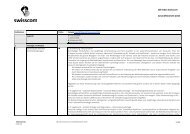Shareholders' Letter
Shareholders' Letter
Shareholders' Letter
You also want an ePaper? Increase the reach of your titles
YUMPU automatically turns print PDFs into web optimized ePapers that Google loves.
Other terms<br />
Bit-stream access (BSA)<br />
Regulated bit-stream access refers to a high-speed link (from the local exchange to the home on<br />
a metallic pair cable) on the last mile, which Swisscom sets up and provides to other telecoms<br />
service providers (TSP) as an upstream service at a price regulated by the government. TSPs can<br />
use this link, for example, to offer their customers broadband services or fast Internet access.<br />
Collocation<br />
Collocation is governed by the Ordinance on Telecommunications Services (Verordnung über Fernmeldedienste,<br />
FDV). The market-dominant provider offers alternative providers non-discriminatory<br />
access to the required locations so that they can use the location and install and operate their<br />
own telecommunications systems at that location.<br />
ComCom (Federal Communications Commission)<br />
As the decision-making authority for telecommunications, the primary responsibilities of the Federal<br />
Communications Commission include issuing concessions for use of the radio frequency spectrum<br />
as well as basic service licences, providing access (unbundling, interconnection, leased lines,<br />
etc.), approving national numbering plans and regulating the conditions governing number portability<br />
and freedom of choice of service provider.<br />
Competition Commission (ComCo)<br />
The Competition Commission enforces the Federal Cartel Act, the aim of which is to safeguard<br />
against the harmful economic or social impact of cartels and other constraints on competition,<br />
and in so doing foster competition. The Competition Commission combats harmful cartels and<br />
monitors market-dominant companies for signs of anti-competitive conduct. It is also responsible<br />
for examining mergers and issuing statements on official decrees that affect competition.<br />
Ex ante<br />
In an ex-ante regime, the particulars of the regulated offerings (commercial, technical and operating<br />
conditions) must be approved by a government authority (authorisation obligation). The<br />
conditions approved by the authority (e.g. price) are known to the parties using the regulated services,<br />
and there is legal provision for the affected providers to have the authorised price examined<br />
for correctness.<br />
Ex post<br />
In an ex-post regime, the parties must agree – wherever possible – on the contractual content (primacy<br />
of negotiation). In the event of a dispute, the authorities decide only on the points on which<br />
the parties have been unable to agree (objection principle).<br />
Federal Office of Communications (OFCOM)<br />
The Federal Office of Communications deals with issues related to telecommunications and broadcasting<br />
(radio and television), and performs official and regulatory tasks in these areas. OFCOM<br />
prepares the groundwork for decisions by the Federal Council, the Federal Department for Environment,<br />
Transport, Energy and Communications (DETEC) and the Federal Communications Commission<br />
(ComCom).<br />
Further Information 234 | 235<br />
Glossary



